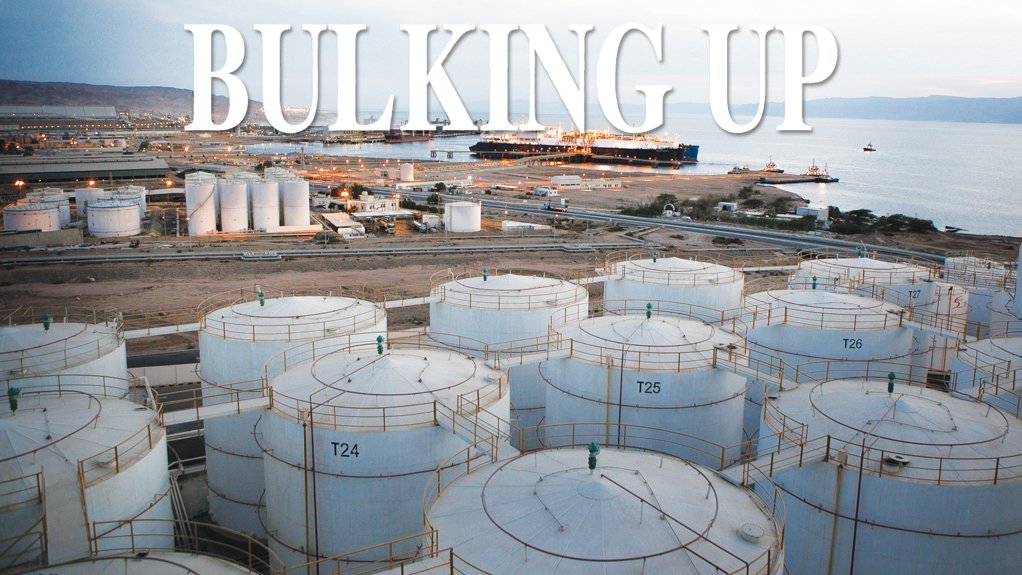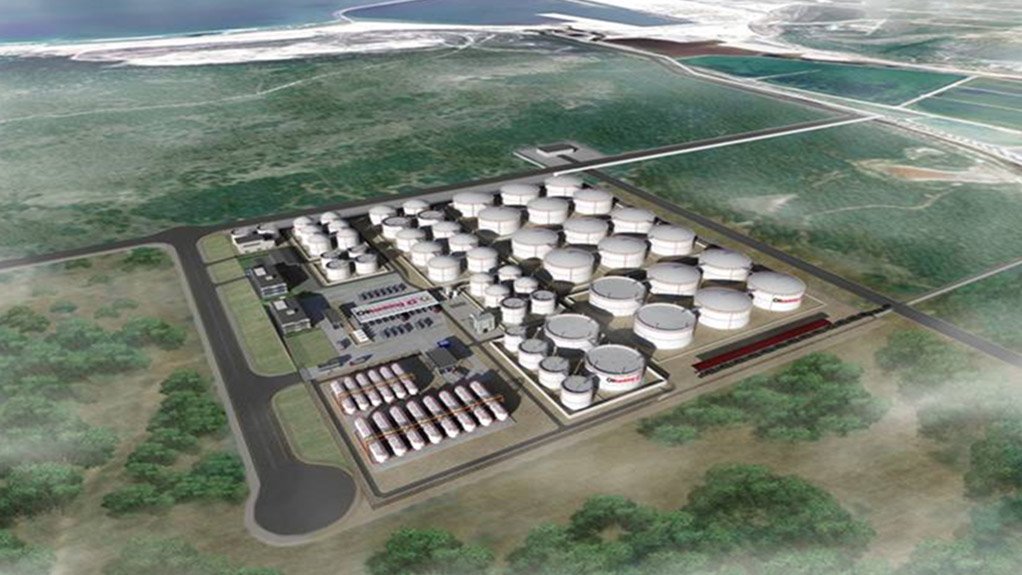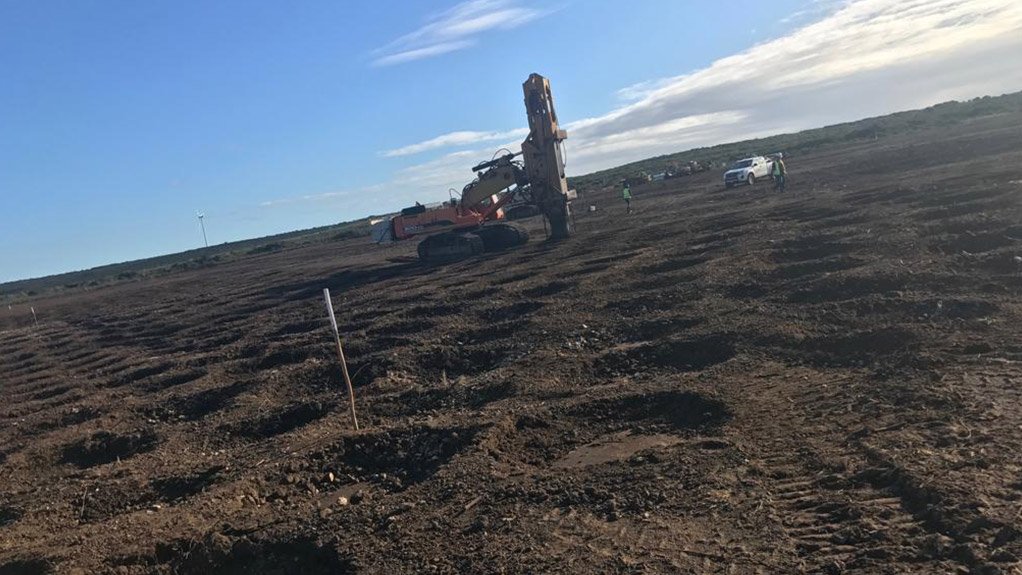New Port of Ngqura liquid bulk facility to serve South African and African markets




OIL TERMINAL An artist’s impression of the new oil terminal to be built
BULK EARTHWORKS Bulk earthworks being done to prepare the site for start of construction in July
A new liquid bulk handling facility at the deep-water Port of Ngqura, in the Eastern Cape, will be built to assist with the predicted future growth of petroleum product consumption in Africa.
The terminal – for which civil construction is scheduled to start in July – will serve as a strategic alternative to and relieve pressure on the Port of Durban, in KwaZulu-Natal, and, to some extent, Cape Town, in the Western Cape, says bulk liquid terminal build, own, operate and transfer joint venture Oiltanking Grindrod Calulo MD Nico Smit.
The terminal will serve oil and gas multinational companies and new entrants into the South African oil industry, as well as international traders, which will also boost the local shipping industry, he adds.
The port currently serves as a transshipment hub from Southern Africa to the western territories in the Indian Ocean. The port will receive product in bulk, which can be transshipped in smaller quantities to ports on the East and West Coasts of Africa.
“The combination of the existing port’s location close to the centre of Port Elizabeth and its ageing infrastructure has contributed to the decision to relocate the petroleum storage and distribution facility to the Port of Ngqura.”
Health and safety considerations played a role, as did the Nelson Mandela Bay municipality’s ambitions to redevelop the port for other sectors, such as tourism, adds Smit.
“The depth of the channel and its location in the protected Nelson Mandela Bay make it one of the best positioned deep-water ports on the South African coast. The bay is protected from the prevailing south-westerly winds by a spit of land and has 330 anchor days a year.”
The port forms part of the Coega Industrial Development Zone, but falls under the jurisdiction of State-owned Transnet National Ports Authority (TNPA).
Development
The launch phase comprises six 11 000 m3 tanks, which will be used during the relocation of the existing petroleum storage and distribution facilities from Port Elizabeth harbour to the Port of Ngqura.
The infrastructure after the launch phase will comprise storage tanks, jetty pipelines and marine loading arms connecting the terminal to a berth in the Port of Ngqura. It will also have a truck-loading gantry and associated fuel terminal infrastructure, such as a vapour recovery unit, firefighting and drainage systems, as well as an office and a workshop.
Following commissioning of the new terminal in November 2020, the tanks currently in use at the Port of Port Elizabeth will be decommissioned and the land redeveloped. This is in line with the city’s plans to clean up the terminal facilities and develop the commercial and tourism sectors.
Detailed design for further development of the 20 ha Ngqura site will be done during construction of the launch phase and the terminal will be developed in phases, with a final total capacity of 790 000 m3.
The terminal will be able to handle any grade of petroleum and, since there is room to expand, it has the potential to provide a storage, handling and blending service for any company needing to import or export bulk liquid or gas products, details Smit.
An overnight train or truck trip from the major centres of Johannesburg, Cape Town and Durban means that these port facilities are well located to meet the needs of import and export markets.
Truck turnaround times will also be reduced through quicker loading rates, while traffic congestion in the city will also be reduced, as the new terminal is located away from the city centre.
“Owing to the deeper draught available at the Port of Ngqura, which can handle vessels of up to 100 000 dead weight tons, and the substantial land available for development, it is anticipated that there will be demand for bulk liquid petroleum storage at the port beyond the existing requirement, which caters only for local distribution.”
This expected development will comprise subsequent development phases. Negotiations are in progress with a number of potential future clients, and will progress as agreements are concluded. Future phases could provide for an additional 550 000 m3 of storage capacity and handling, he notes.
The terminal has been designed and will be constructed to the best international standards to avoid contamination of the soil or groundwater and minimise the release of vapour into the atmosphere, for example, through the installation of a vapour recovery unit. These measures will also result in improved health and safety.
Every effort was made to minimise the human and environmental impact of the terminal, which included the appointment of an environmental specialist to conduct a search and rescue exercise and relocate fauna and flora from the site to a safe location, explains Smit.
“The liquid bulk facility will create socioeconomic benefits and will boost the Nelson Mandela Bay economy. The project will generate local jobs during the construction phase and promote skills development in the construction industry, as well as support local suppliers and service providers. Once operational, the facility will provide permanent positions and empower local businesses,” explains Smit.
Regional Role
“The terminal can play a role in the predicted future growth of petroleum product consumption in Africa, as it can be used as a hub by traders to receive product in bulk, which can then be transshipped in smaller quantities to ports on the East and West Coasts. In the South African context, the terminal is an alternative to Durban for petroleum product imports and translocation by rail to the hinterland,” highlights State-owned port operator Transnet National Ports Authority (TNPA).
A proposed aluminium smelter at Coega was considered, but abandoned, owing to power constraints.
“With the change of emphasis for Ngqura, the future of this port lay in becoming a bulk product handling transshipment hub for the sub-Saharan Africa and Western Indian Ocean regions,” explains TNPA.
TNPA will build a modern manganese loading facility at the Port of Ngqura to improve manganese ore export. The relocation of the current manganese facility from Port Elizabeth to Ngqura will increase the capacity from 5.5-million tons a year to 16-million tons a year.
The horizontal geometry of the port is such that 15 000-dead-weight-ton bulkers and 12 500 twenty- foot-equivalent unit cellular container ships can manoeuvre within the port, although initial dredging is being limited to accommodate the design vessels only, details TNPA in project documents.
“While we have no immediate liquefied natural gas (LNG) plans for the terminal, we are interested in playing a role in LNG storage in South Africa and are monitoring developments in this sector.”
The bulk liquid storage and handling facilities at the Port of Ngqura can handle petroleum, chemical or vegetable products. This presents the opportunity for companies to use the services of a modern, safe and efficient facility to move these products, whether for local or regional clients, the document adds.
Specialised terminal facilities in Durban and Cape Town and a specialised trucking fleet currently serve clients in the molasses and vegetable oil industry and they are expected to also make use of the new facilities at Ngqura.
The infrastructure, depth and marine assets at Ngqura created opportunities to handle abnormal cargo. Since April 2013, the port has been handling imported wind turbines, with about 2 000 pieces of abnormal cargo having required discharging, storage and removal from the port, TNPA highlights.
The port also serves regional and national, imports and exports industrial bulk commodity requirements. Containers handled include transshipment cargoes, primarily part of East and West Coast traffic, but also interline traffic from South America to Asia.
The facility will be Oiltanking’s first holding in a South African fuel terminal, while it will be Calulo’s first clean products terminal. The Ngqura liquid storage facility provides diversification for Grindrod into fuel storage and handling and aligns with its coastal tanker shipping through Unicorn Tankers.
Comments
Press Office
Announcements
What's On
Subscribe to improve your user experience...
Option 1 (equivalent of R125 a month):
Receive a weekly copy of Creamer Media's Engineering News & Mining Weekly magazine
(print copy for those in South Africa and e-magazine for those outside of South Africa)
Receive daily email newsletters
Access to full search results
Access archive of magazine back copies
Access to Projects in Progress
Access to ONE Research Report of your choice in PDF format
Option 2 (equivalent of R375 a month):
All benefits from Option 1
PLUS
Access to Creamer Media's Research Channel Africa for ALL Research Reports, in PDF format, on various industrial and mining sectors
including Electricity; Water; Energy Transition; Hydrogen; Roads, Rail and Ports; Coal; Gold; Platinum; Battery Metals; etc.
Already a subscriber?
Forgotten your password?
Receive weekly copy of Creamer Media's Engineering News & Mining Weekly magazine (print copy for those in South Africa and e-magazine for those outside of South Africa)
➕
Recieve daily email newsletters
➕
Access to full search results
➕
Access archive of magazine back copies
➕
Access to Projects in Progress
➕
Access to ONE Research Report of your choice in PDF format
RESEARCH CHANNEL AFRICA
R4500 (equivalent of R375 a month)
SUBSCRIBEAll benefits from Option 1
➕
Access to Creamer Media's Research Channel Africa for ALL Research Reports on various industrial and mining sectors, in PDF format, including on:
Electricity
➕
Water
➕
Energy Transition
➕
Hydrogen
➕
Roads, Rail and Ports
➕
Coal
➕
Gold
➕
Platinum
➕
Battery Metals
➕
etc.
Receive all benefits from Option 1 or Option 2 delivered to numerous people at your company
➕
Multiple User names and Passwords for simultaneous log-ins
➕
Intranet integration access to all in your organisation





















